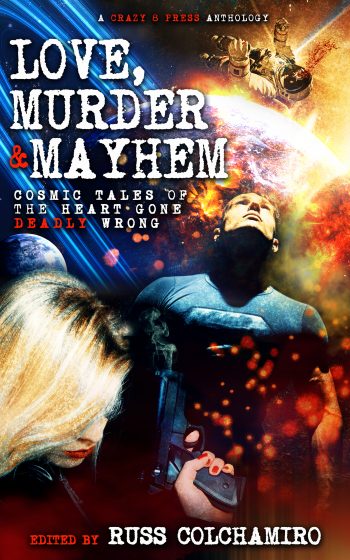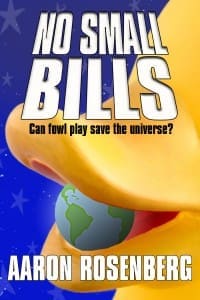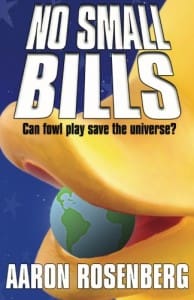 Aaron Rosenberg — a best-selling author and founding member of Crazy 8 Press — is back again with his latest scifi comedy novel in the Duckbob Spinowitz Adventures, Not for Small Minds.
Aaron Rosenberg — a best-selling author and founding member of Crazy 8 Press — is back again with his latest scifi comedy novel in the Duckbob Spinowitz Adventures, Not for Small Minds.
* * *
Q: For those not familiar with your Duckbob character… um… how exactly is it that he’s a… well… a duck… man? Who happens to be the key to saving the Universe? (Full disclosure, milk shot through my nose as I typed those words)
A: Right, so the short version—Bob Spinowitz is a regular guy who got abducted by aliens (the “Grays,” the ones you see in all those movies and TV shows and documentaries) and they altered him into this man-duck hybrid. Then dumped him by the side of the road and left him to pick up his life from there. He changed his name to “DuckBob” because he figured people would call him that anyway so why not defang them a bit by beating them to the punch?
Q: Sure, sure. So… Not for Small Minds is the fourth and — so far as you’ve said — the last novel in your DuckBob scifi comedy series. How does it feel to be at the end? 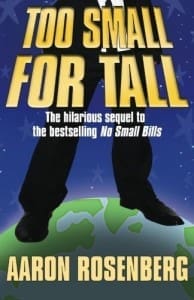
A: Both good and sad. I really like writing DuckBob, he’s a great character with a great voice, so I’m a little sorry there won’t be more novels. At the same time, I’ve always told myself I wouldn’t be one of those people who wrote twenty-seven books in a series that really should have been only three. There’s a natural rhythm to these things, some stories are meant to go on and others are meant to end. I feel like I’ve finished DuckBob’s big story here and I’m happy with the results. To write another novel would feel like I was dragging things out, and I’d worry that I was diminishing him and his voice by stretching it past what was intended.
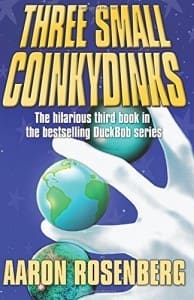 Q: The first three books in the series — No Small Bills, Too Small for Tall, and Three Small Coinkydinks — focused on Duckbob, Tall, and then Ned. Not for Small Minds puts Mary front and center. What was your biggest challenge — and your goal — for giving Mary center stage?
Q: The first three books in the series — No Small Bills, Too Small for Tall, and Three Small Coinkydinks — focused on Duckbob, Tall, and then Ned. Not for Small Minds puts Mary front and center. What was your biggest challenge — and your goal — for giving Mary center stage?
A: The biggest challenge was that I really wanted this to be Mary’s book, not DuckBob’s. But he’s the narrator, and he has a very . . . strong personality. Which meant I had to be very careful to let Mary, who tends to be more soft-spoken, shine on her own even though it’s all through his words. I also had to be careful because DuckBob absolutely adores Mary—as he should—but that means he sees her as this perfect being. Since this is Mary’s story, I needed to make sure her flaws were visible as well, so that we’d be able to relate to her properly and not see her as some idealized figure.
Q: Beyond the obvious — Duckbob and team rush to save the Universe again — what’s the gist of Not for Small Minds? 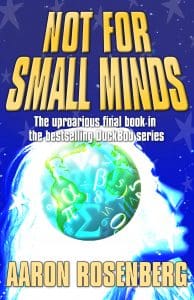
A: Mary invites DuckBob to accompany her to her college reunion. He jumps at the chance to see something of her past, but is a bit dismayed when he does. Then they’re summoned by the Grays to deal with the invaders from another reality once again—only this time it’s the Grays themselves who are under attack! Mary and DuckBob have to figure out how to rescue the Grays and deal with the invaders once and for all, but it’s going to take more than just them and Tall and Ned to accomplish that. They need a lot of help, which they get from the unlikeliest places, and that creates problems of its own.
Q: Scifi comedy — as a subgenre — seems to go in and out of favor in the public consciousness. What attracts you to this type of story?
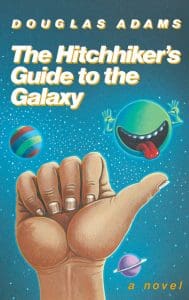 A: You know, I love SF comedy. I have since I was a kid. I remember reading Ron Goulart’s Calling Dr. Patchwork and Harry Harrison’s The Stainless Steel Rat and loving them. Then of course there was The Hitchhiker’s Guide to the Galaxy, which just took things to a whole new level. Science fiction is one of those genres like fantasy that can blend with almost any other genre and can range in tone from incredibly serious to ridiculously silly but I tend to prefer the silly—I think being able to explore new worlds and other races and technologies so advanced they seem like magic just lends itself to the absurd, which in turn allows you to highlight human nature and values like love and loyalty and friendship and how those can endure in even the wildest circumstances.
A: You know, I love SF comedy. I have since I was a kid. I remember reading Ron Goulart’s Calling Dr. Patchwork and Harry Harrison’s The Stainless Steel Rat and loving them. Then of course there was The Hitchhiker’s Guide to the Galaxy, which just took things to a whole new level. Science fiction is one of those genres like fantasy that can blend with almost any other genre and can range in tone from incredibly serious to ridiculously silly but I tend to prefer the silly—I think being able to explore new worlds and other races and technologies so advanced they seem like magic just lends itself to the absurd, which in turn allows you to highlight human nature and values like love and loyalty and friendship and how those can endure in even the wildest circumstances.
Q: In addition to the novels, you’ve also written a handful of Duckbob short stories, which, I’m here to say, are hilarious! Any chance we’ll see more Duckbob in the future? (please please please!)
A: Ha, yes, we’ll definitely see DuckBob again in short stories! I’m pretty sure he won’t let me shut him up permanently! He’s actually really well suited to the short story length, and that allows me to tell fun one-offs about him and his friends without having to worry about tying them into a bigger story. Eventually, if there are enough of them, I may collect all the stories into a DuckBob anthology, but we’ll see.
Q: Thanks Aaron! Where can new and returning fans find Not for Small Minds — and the entire Duckbob series?
A: My pleasure! You can find all the DuckBob Spinowitz Adventures here on the Crazy 8 Press site. They’re also available through Amazon and Barnes & Noble .
* * *
Aaron Rosenberg is the author of the best-selling DuckBob SF comedy series, the Dread Remora space-opera series, the Relicant epic fantasy series with Steve Savile, and the O.C.L.T. occult thriller series with David Niall Wilson. Aaron’s tie-in work contains novels for Star Trek, Warhammer, World of WarCraft, Stargate: Atlantis, Shadowrun, Eureka, and more. He has written children’s books (including the original series STEM Squad and Pete and Penny’s Pizza Puzzles, the award-winning Bandslam: The Junior Novel, and the #1 best-selling 42: The Jackie Robinson Story), educational books on a variety of topics, and over seventy roleplaying games (such as the original games Asylum, Spookshow, and Chosen, work for White Wolf, Wizards of the Coast, Fantasy Flight, Pinnacle, and many others, and both the Origins Award-winning Gamemastering Secrets and the Gold ENnie-winning Lure of the Lich Lord). He is the co-creator of the ReDeus series, and a founding member of Crazy 8 Press. Aaron lives in New York with his family. You can follow him online at gryphonrose.com, on Facebook at facebook.com/gryphonrose, and on Twitter @gryphonrose.

